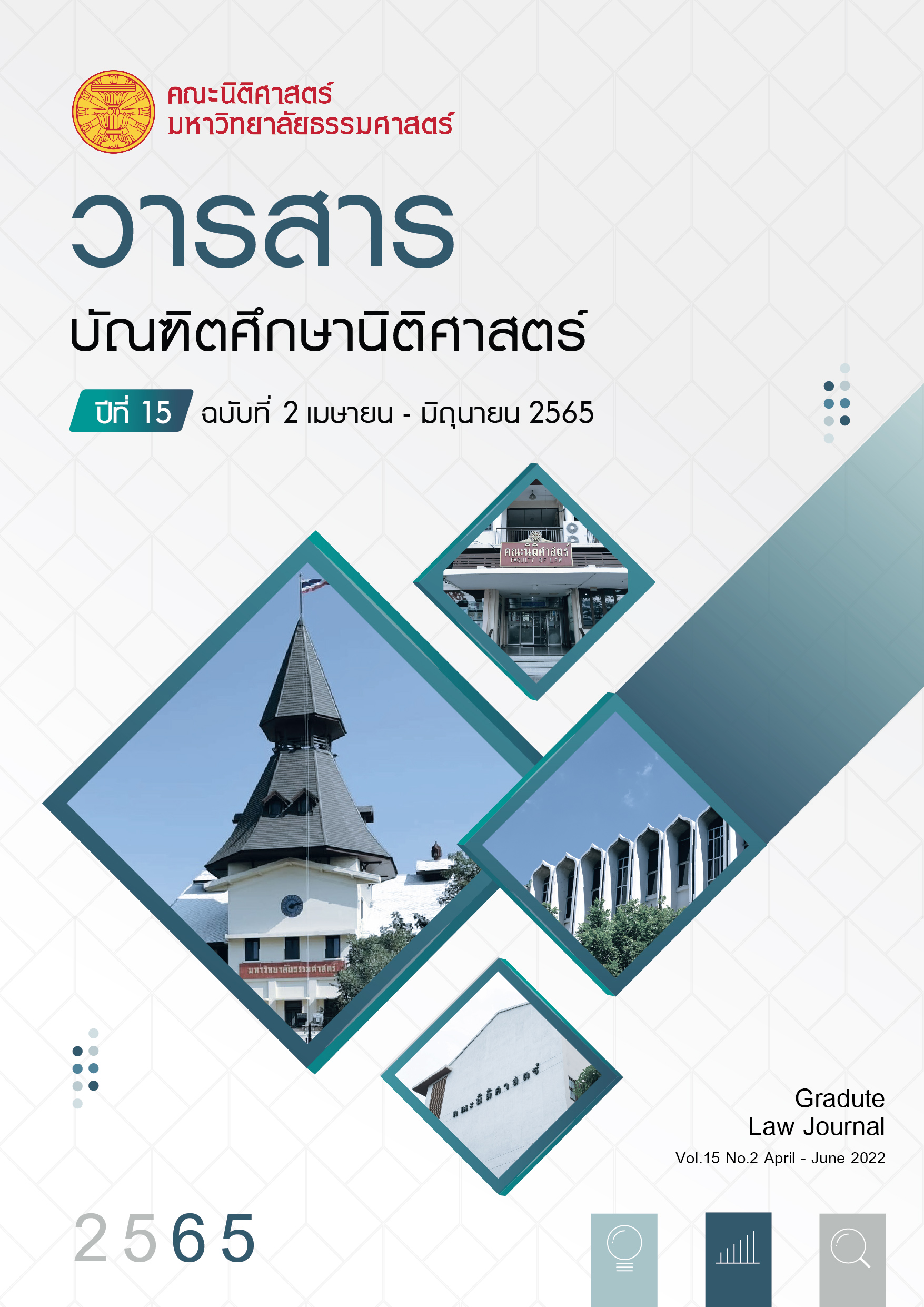การกำหนดหลักประกันในการปล่อยชั่วคราวโดยคำนึงถึงฐานะทางเศรษฐกิจของผู้ถูกดำเนินคดีอาญา
คำสำคัญ:
ปล่อยชั่วคราว, ประกันตัว, ฐานะทางเศรษฐกิจ, หลักประกันบทคัดย่อ
การปล่อยชั่วคราวในประเทศไทยส่วนใหญ่แล้วเจ้าหน้าที่มักอนุญาตให้ปล่อยชั่วคราวโดยมิได้พิจารณาถึงความจำเป็นในการเอาตัวบุคคลไว้ในอำนาจรัฐแต่กลับเน้นไปที่การปล่อยชั่วคราวโดยมีประกันหรือหลักประกันเป็นหลัก อีกทั้งในการกำหนดหลักประกันก็ไม่ได้คำนึงถึงสถานะของบุคคลที่มีฐานะทางเศรษฐกิจที่แตกต่างกัน ทำให้เกิดความเหลื่อมล้ำในแง่ที่ว่าผู้ถูกดำเนินคดีอาญาที่มีฐานะยากจนไม่สามารถหาหลักประกันมาเพื่อขอปล่อยชั่วคราวได้แม้ว่าตนจะเข้าเงื่อนไขที่จะได้รับการปล่อยชั่วคราวก็ตาม
บทความนี้จึงมุ่งศึกษาปัญหาที่เกี่ยวกับการปล่อยชั่วคราวในประเทศไทย โดยเฉพาะอย่างยิ่งในเรื่องรูปแบบของการกำหนดหลักประกันในการปล่อยชั่วคราว และแนวทางการแก้ไขปัญหาดังกล่าว รวมไปถึงแนวคิดเกี่ยวกับการลงโทษปรับโดยคำนึงถึงฐานะทางเศรษฐกิจของผู้กระทำความผิด (Day Fine) เพื่อนำแนวคิดดังกล่าวมาปรับใช้กับการกำหนดหลักประกันในการปล่อยชั่วคราว อีกทั้งยังศึกษารูปแบบการกำหนดหลักประกันในการปล่อยชั่วคราวในกฎหมายต่างประเทศ ทั้งในประเทศฝรั่งเศสซึ่งเป็นประเทศที่ใช้ระบบกฎหมาย Civil Law และประเทศอังกฤษซึ่งเป็นประเทศที่ใช้ระบบกฎหมาย Common Law
ด้วยเหตุผลดังกล่าวข้างต้น ผู้เขียนเห็นว่าในการแก้ไขปัญหาดังกล่าวหากเจ้าหน้าที่พิจารณาคำร้องขอปล่อยชั่วคราวโดยพิจารณาถึงความจำเป็นในการเอาตัวบุคคลไว้ในอำนาจรัฐเป็นหลักแล้ว ในกรณีที่มีการอนุญาตให้ปล่อยชั่วคราวโดยกำหนดเงื่อนไขให้วางหลักประกันนั้น ควรนำแนวคิดเรื่องการปรับโดยคำนึงถึงฐานะทางเศรษฐกิจ (Day Fine) มาปรับใช้กับการกำหนดหลักประกันในการปล่อยชั่วคราว เพื่อให้ผู้ถูกดำเนินคดีอาญาได้รับการพิจารณาหลักประกันที่เหมาะสมกับฐานะทางเศรษฐกิจของตนเป็นรายกรณีไป โดยวิธีการดังกล่าวจะช่วยลดปัญหาความไม่เสมอภาคในแง่ที่ว่าผู้ที่มีฐานะทางเศรษฐกิจดีมีโอกาสได้รับการปล่อยชั่วคราวดีกว่าบุคคลที่มีฐานะทางเศรษฐกิจไม่ดี ทำให้ไม่มีใครต้องถูกควบคุมตัวไว้โดยไม่มีความจำเป็น เนื่องจากบุคคลทุกคนที่มีสิทธิตามเงื่อนไขที่จะร้องขอให้ปล่อยชั่วคราวจะสามารถหาหลักประกันที่เหมาะสมกับฐานะของตนมาวางตามเงื่อนไขของศาลได้
เอกสารอ้างอิง
บรรณานุกรม
หนังสือ
ภาษาไทย
กุศล บุญยืน, คำอธิบายประมวลกฎหมายวิธีพิจารณาความอาญา (นิติบรรณการ 2541).
คณิต ณ นคร, นิติรรมอำพรางในนิติศาสตร์ไทย (วิญญูชน 2548).
--, ประชาธิปไตยกับการตั้งรังเกียจทางสังคม (พิมพ์ครั้งที่ 2, วิญญูชน 2556).
--, ประมวลกฎหมายวิธีพิจารณาความอาญา หลักพื้นฐานและพื้นฐานความเข้าใจ (พิมพ์ครั้งที่ 4, วิญญูชน 2562).
--, กฎหมายวิธีพิจารณาความอาญา (พิมพ์ครั้งที่ 10, วิญญูชน 2564).
ณรงค์ ใจหาญ, หลักกฎหมายวิธีพิจารณาความอาญา เล่ม 1 (พิมพ์ครั้งที่ 14, วิญญูชน 2565).
ปกป้อง ศรีสนิท, กฎหมายอาญาชั้นสูง (พิมพ์ครั้งที่ 3, วิญญูชน 2563).
ภาษาอังกฤษ
Cristopher J. Emmins, A Practical Approach to Criminal Procedure (2nd edn, London: Financial
Trainning Publiaction Limited 1983).
John A. Andrews, Human Rights in Criminal Procedure (A Comparetive Study London: Martinus
Nijhoff Publishers 1982).
A.V. Sheenhan, Criminal Procedure in Scotland and France (Edinburgh: Her Majesty’ s Stationery
Office 1972).
บทความ
เกียรติขจร วัจนะสวัสดิ์, ‘วิเคราะห์การแก้ไขกฎหมายวิธีพิจารณาความอาญาในส่วนที่เกี่ยวกับการคุ้มครองสิทธิของผู้ต้องหา หรือจำเลย’ (2528) 15 วารสารนิติศาสตร์ 3.
คนึง ฦๅไชย, ‘วิธีพิจารณาความอาญาตามกฎหมายอังกฤษ’ (2530) 10 วารสารอัยการ 110.
วีรพล ปานะบุตร, ‘โทษปรับในสวีเดน’ (2522) 14 วารสารอัยการ 28.
วิทยานิพนธ์
ฉัตรชัย ตังคณานุกูลชัย, ‘การประกันตัวในคดีอาญา: ศึกษาเฉพาะกรณีการประกันภัยอิสรภาพ’ (วิทยานิพนธ์ นิติศาสตรมหาบัณฑิต มหาวิทยาลัยธุรกิจบัณฑิตย์ 2549).
พิชยนต์ นิพาสพงษ์, ‘โทษปรับโดยกำหนดตามวันและรายได้ (day fine)’ (วิทยานิพนธ์ นิติศาสตรมหาบัณฑิต
มหาวิทยาลัยธรรมศาสตร์ 2542).
พิรุฬห์ โตศุกลวรรณ์, ‘การลงโทษปรับทางอาญา’ (วิทยานิพนธ์ นิติศาสตรมหาบัณฑิต จุฬาลงกรณ์มหาวิทยาลัย
70.
วราภรณ์ ศิริสัจจวัฒน์, ‘โทษปรับ: ศึกษากรณีระบบวันปรับ’ (วิทยานิพนธ์ นิติศาตรมหาบัณฑิต จุฬาลงกรณ์มหาวิทยาลัย 2540).
สุรินทร์ มากชูชิต, ‘ระบบปล่อยชั่วคราวผู้ถูกกล่าวหา: ศึกษาการใช้หลักประกันในคดีอาญา’ (วิทยานิพนธ์ นิติศาสตรมหาบัณฑิต มหาวิทยาลัยธรรมศาสตร์ 2555).
อารีย์พร กลั่นนุรักษ์, ‘การปล่อยชั่วคราวโดยกำหนดเงื่อนไข’ (วิทยานิพนธ์ นิติศาสตรมหาบัณฑิต มหาวิทยาลัยธุรกิจ บัณฑิตย์ 2545).
หนังสือพิมพ์
คณิต ณ นคร, ‘การเอาตัวไว้ในอำนาจรัฐกับการปล่อยชั่วคราว’ มติชนสุดสัปดาห์ (22-28 ตุลาคม 2553 และ 29
ตุลาคม – 5 พฤศจิกายน 2553.
เอกสารอิเล็กทรอนิกส์
Isaranews, ‘การใช้โทษปรับตามรายได้แทนจำคุก โดย สถาบันวิจัยเพื่อการพัฒนาประเทศไทย’ (Isaranews, 6
มิถุนายน 2554) <http://www.isaranews.org/isaranews-article/2311-การใช้โทษปรับตามรายได้แทน
จำคุก-สถาบันวิจัยเพื่อการพัฒนาประเทศไทย.html> สืบค้นเมื่อวันที่ 1 พฤษภาคม 2564.
คำพิพากษา
คำพิพากษาฎีกาที่ 1047/2512
คำสั่งคำร้องศาลฎีกาที่ 617/2528
ดาวน์โหลด
เผยแพร่แล้ว
ฉบับ
ประเภทบทความ
สัญญาอนุญาต
ลิขสิทธิ์ (c) 2022 บัณฑิตศึกษานิติศาสตร์

อนุญาตภายใต้เงื่อนไข Creative Commons Attribution-NonCommercial-NoDerivatives 4.0 International License.
บทความหรือข้อความคิดเห็นใด ๆ ที่ปรากฏในวารสารบัณฑิตศึกษานิติศาสตร์เป็นความรับผิดชอบของผู้เขียนบทความโดยเฉพาะ คณะนิติศาสตร์ มหาวิทยาลัยธรรมศาสตร์ และกองบรรณาธิการไม่จำเป็นต้องเห็นด้วย



